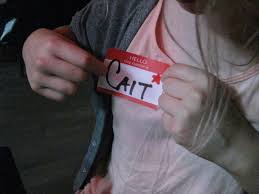Paris is the “City of light.” New York City is the “Big Apple.” We often hear nicknames for geographic locations, but people have nicknames too.
By definition, a nickname is a substitute name for a person, place, or thing. Sometimes we choose to use a shortened version of our full name (Ray for Raymond), and sometimes others decide to call us a nickname as a form of affection (Buddy) or to express our character (Honest Abe).
Nicknames also can be foisted upon us without our consent. Do you get frustrated when you write your full name on a name badge, yet people routinely shorten it?
According to work etiquette expert Elaine Varelas, it is perfectly acceptable to politely correct someone who either mispronounces your name or uses a nickname you don’t like.
“If someone uses a nickname without asking your preference,” says Varelas, “you can easily and politely say, “Actually, I prefer to be called Alexandra rather than Alex.”
She adds that it is important to correct the nickname offender as soon as possible before the wrong name takes root with both that person and others. “Most people want to use and pronounce names correctly, so making your preferences known is beneficial for everyone,” Varelas says.

Some nicknames make sense, like Pat for Patrick or Jill for Jillian, but have you ever wondered about the origins of some well-known nicknames? Why are some Williams called Bill? And how did Peggy become a nickname for Margaret? Here’s what we discovered.
Why is Dick a nickname for Richard?
The name Richard was very commonplace during the Middle Ages in England. Shortened versions of the name became popular as a way of distinguishing friends and neighbors from each other. Richard was first shortened to Rich and Rick. Then rhyming variations like Hick and Dick became popular. Dick somehow survived all the way into the 20th century.
What about Bill for William?
The same explanation can be used for how Bill became a nickname for William. Also a popular English name for English boys in the Middle Ages, William was shorted to Will. Will rhymes with Bill. And it stuck through time.
Why is Chuck a nickname for Charles?
This one’s pretty easy. The name Charles in Middle English was “Chukken.”
How did Margaret become Peg or Peggy?
The once name Margaret has been shortened to Meg and Maggie for centuries. The popular name also became the rhyming alternatives of Peg and Peggy.
How did Hank become a nickname for Henry?
One theory is that Hank comes from Hendrick, the Dutch form of the English name Henry.
What about Jack for John?
I’m not sure why a one-syllable name like John needs another one-syllable substitute, but there is a possible explanation. The Normans added “kin” to the end of a name to make a diminutive. Jen was their way of pronouncing John. So, a young John became “Jenkin,” which became “Jakin,” which eventually became “Jack.” Whew!
How does Ted come from Edward?
You’ve probably figured out by now that there was a shortage of first names in the Middle Ages. To differentiate between people with the same name, people did some letter swapping. If a name began with a vowel, such as Edward, people would sometimes add a consonant. So, Ed became Ted. Ted was also a nickname for Theodore, but that’s another story.
Why is Harry a nickname for Henry?
Harry has been a popular variation of Henry since the Middle Ages. Some historians think it began as a mispronunciation of the French “Henri.” Another explanation is that people did some letter swapping to distinguish between all the Henrys.
How does Jim come from James?
Jim and Jimmy have been popular nicknames for James since at least the 18th century. The best guess is creative vowel switching.
Why is Sally a substitute for Sarah?
Creative consonant switching is how Sally became a popular nickname for Sarah in England and France. Today, the original Hebrew name Sarah is more commonplace.
It’s interesting to note that many of these nicknames are not as common today as they once were. But baby names come in cycles, and 2020 statistics show that some “vintage” names (like Hazel, Stella, and Leo) are making a comeback. Will vintage nicknames come back as well? We’ll have to wait and see what shows up on the name tags of the future.



